Silence.
Total blackout. Even the moon disappears for a long minute.
The barely visible faces in the crowd hold their breath. Suddenly, a loud scream comes from behind me. For a moment, my heart races faster.
“Jowi! Jowi! Jowi!” a solitary voice calls in the darkness.
The call is picked by the shadowy figures crouched around me. Quickly, it spreads into a call and response tune among the crowd. From the shadows, figures emerge in a sprint, going round and round in a dizzying rhythm.
Chwaaa!
A match strikes, and the mound of sticks and twigs neatly arranged at the centre of the crowd bursts into flames.
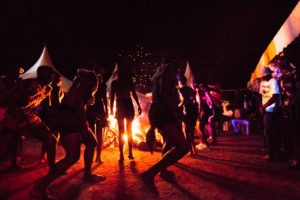
Dancers setting the pace for Eminayo night (Photo: Anthony Muwasu)
One can now make out the dancers as they twist and jump to the beats of the frenzied drums coming to a frenzied climax, pieces of cloth slamming against their thighs and brown calabash bras jerking on the chests of the females.
Then just as suddenly, all stops.
Silence.
Eminayo Night has just began.
Sometimes all you need is great friends and a thirst for adventure. As a travel blogger, one is always seeking their next adventure and the Rusinga Festival did not disappoint. A meticulously organized event that leaves one completely emerged in song, dance, art, food, fashion, stories and not forgetting Lake Victoria, it captured the Abasuba culture in totality. The Rusinga Cultural Festival has definitely won a place in my travel calendar – Emily Nderitu, Travel blogger (visit her blog)
A feast of Stories
The 2018 edition of Rusinga Cultural Festival was held on the 20th & 21st December. The venue was Rusinga Island on Lake Victoria, locally known as Nam Lolwe. This teller of stories was there looking for holiday cheer, and a story to tell.
Translated from Suba to mean “storytelling or stories”, Eminayo is a cocktail of performance storytelling, poetry, music, song and dance around the fireplace. It was definitely a treat not just for the approximately 500 men, women and young adults in the audience that night but also for storytellers like me. The performances featured dance groups drawn from the lake region, including AGES, Migori Percussion, AFRICATS and ACTS and Spoken Word artist Nyoremo. Catchy beats and songs were crooned by the soulful Soul Afriq and Kwach band.

Chunga got the crowd charged with his tales (Photo: Anthony Muwasu)
Punglu Pangla George Chunga, a highly energetic and moving storyteller from Kisumu and Nairobi’s Zamaleo ACT is also on the program.
And stories come both from the region and away. Chunga brings to life the story of Ondiek Marach, the bad hyena, who the village was forbidden to eat. Was it a taboo, though, to catch him? Roast him? Taste his roasted meat?
Alumbe and Titi share a historical legend from the Kenyan coast, the story of Fumo Liyongo, who stood at the forefront in fighting oppressive leadership. It is said that to this very day, the spot where he placed his knee in his dying moments is still visible.

With Emily (Left) and Akinyi (Right).
The Great African Caravan featuring participants from India, Uganda, Argentina, Netherlands and Kosovo, and with an aim of traversing Africa in 200 days, renders a percussion fusion.
The vibrant echoes ascend to the skies and fall back in harmony with the rains, reenergizing the performers and keeping the audiences indifferent to the sudden change of weather. At 11:00pm, the performances come to an end but the audience is not ready to go to bed just yet.
“DJ, rusha kitu!” they called out.
Ukuidiewana Kwa Amaato
Friday morning, I join a procession of joggers, dancers and other eclectic weird people like me from Kamasengre grounds to Luore Beach.
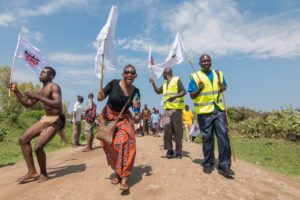
Procession to Luore Beach (Photo: Anthony Muwasu)
This beach front, from where a wide expanse of the lake can be seen was the setting for the boat race. And what a multitude we find! The beach was flooded with both locals and non-locals who had turned up to witness the competition.

Photo: Meshack Yobby
“The festival is actually attracting Awarusinga who had not been coming home before during the festive season,” says Anthony Muwasu who also double’s up as the festival photographer. He is from Rusinga himself though based in Nairobi.
I overhear some girls explain that they are from Kendu Bay and have come to the event with their brothers in tow as tour guides and escorts.
“I have met people who have told me they are from South Africa,” Anne Eboso, the festival founder, tells me.
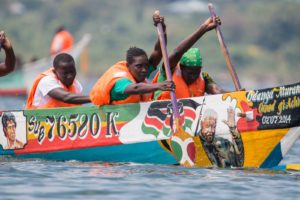
Photo: Anthony Muwasu
With 8 boats, each with 7 rowers, the men’s race is fast and competitive. Their muscles glisten in with sweat and effort as they dip and raise their oars in unison, the helmsman guiding the boat to ensure it stays on course.
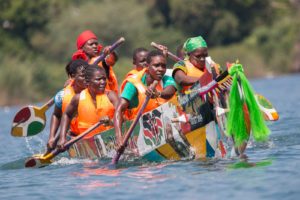
One of the racing teams (Photo: Anthony Muwasu)
The women’s race pitting 4 teams is captivating. Groups of men race alongside the women’s boats, cheering them excitedly.
“Those are spouses, boyfriends and admirers of the women in the competition. They have hired the boats specifically to cheer their women,” Yobby later tells me.
What better expression of romance than this?
And awiifu, the enyadhi the rowers display as they do the homerun, raising their oars to salute to the crowds as their boats muscle against the water-bumps to hit the shores. They show off their coordination skills and team work in rhythm:
Row, row, high five!
Row, row, high five!
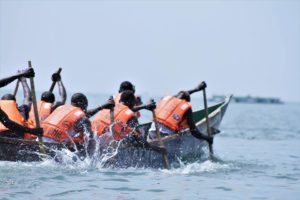
Photo: Meshack Yobby
Others jump from their boats in one fluid move at the finish line and dive for a cooling swim into the waters.
The boat racing activity is a major attraction at Rusinga Festival, and has been sponsored by the US Embassy for the last four years.
Reading on the Island
The Island Reading Series is the first of several such activities that will be taking place in the region. The activity was organized in partnership with Goethe Institut Nairobi and All For Books, a not for profit organization that aims to promote reading for pleasure among children and young adults.
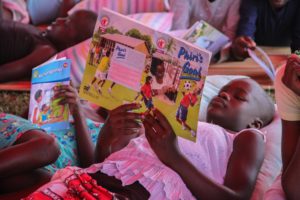
Photo: Meshack Yobby
As the team and I set up the tent, we haven’t figured out how to attract children to come and read amid all the action around. There is music blaring from humongous overhung speakers, a tug of war is going down followed by traditional wrestling. Still, we lay down reed mats and cushions and display storybooks around the tent.

Photo: Meshack Yobby
In ones, twos and threes, curious children stream in, throwing uncertain glances around before picking and browsing through the books.
Reading at the festival was cool. When the reading instructor asked who would read an English storybook I was so scared. Even standing up was a problem But I was brave enough to do it. I really enjoyed and I want to try in various places so as to read aloud to children. I am so happy that I had a chance to tell children a lovely story! – Grace Okulo, 13 years old.

Makeshift Bookshelf at the Reading Tent (Photo: Meshack Yobby)
“Wanalipisha kuingia?” I turn to look at the young girl who had asked the question and shake my head. She enters the tent quickly as if she is afraid I will change my mind. She does not leave for almost an hour.
I strike a conversation with Emily, the lady to whom the query had been directed. Is she from around, I enquire. She smiles, shaking her head. She is from Central Kenya, she says. She met two ladies at the Lamu Festival in November and seeing how passionately they talked about the Rusinga festival, she just had to come and experience for herself.
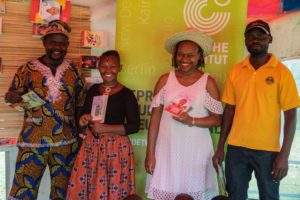
From Left: Chunga, Elizabeth (Goethe) and Hillary (All For Books Kenya)
Meanwhile, the reading tent gradually swells with numbers. Those who miss space on the mats sprawl on the grass, clutching storybooks. For some, only their moving eyes can tell you they are reading. Some use a finger to trail the sentences while for others, you can see their lips moving as they read silently to themselves. Younger children turn the pages of picturebooks in rapt concentration. I forget the number of times No Feast for Kiundu, The Forever Tree and Who am I? The Story of Barack Obama changes hands.
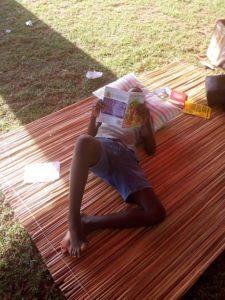
Enjoying reading is all about comfort!
At Chunga’s prompt, the children read out loud to each other from Hezekiel Gikambi’s Safari ya Serengeti. Even Goethe’s Elizabeth Wichenje joins in, reading from a copy of A letter to Pearl.
“The Island Reading Series more than met my expectations!” she tells me later. “Hope to make it bigger and better next year.”
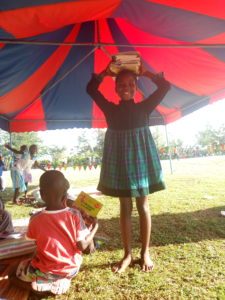
After the session, this girl collected all the books from the mats and handed them to me
I spot 12 year old Bromick, a Class 6 pupil at Rusinga Educational Centre. He has been reading non-stop for the last 3 hours. How many books has he read so far? I ask. Three, he answers with a shy smile.
I ask him to pick a book from the pile, a gift from us, I say. He does not miss a beat. He chooses a copy of Fall of the Jungle Kingdom and luckily the author, Hillary Namunyu is at hand to autograph it. The smile on the boy’s face and the grip he has on the book as he walks away says everything.
***** ***** *****
The 2019 Rusinga Cultural Festival will take place on Thursday 19th & Friday 20th December. If you have some extra days, stay.
Take a motorboat, ferry or waterbus across the lake and visit Takawiri and Mfangano islands. Stop over at Mbassa, the birds’ island, and enjoy some moments with the expansive avian population found there.
Have a chat with fishermen at Kolunga Beach, who have given their boats names such as Oluma Chiemo (I only come here to eat) and Romantic Pastors.
Spend an evening at Sienga Beach and enjoy a multisensory experience as you watch the women bring their houses to the lake for cleaning. Watch them as they wash clothes, clean utensils and bathe children. Only then do they take a relaxing swim before tying everything in a package and hefting it on their heads. Everything spruced up, one hand secures the load while from the other swings a ten litre mtungi of water for the cooking.
Watch the sun go down at Litare Beach. Here, you will see small boats stretched into the horizon, which specialize in fishing Omena. As dusk descends, you will see little lights popping one after the other all over the lake, earning it the popular monikers, The Ghost City and the City of a Thousand Lights.
Fall in love. With yourself. With nature. With life. Fall in love all over again on the shores of Nam Lolwe.
I always look forward to Rusinga Festival. Having travelled with my children, the children’s reading tent was a brilliant idea! Watching children walk into the area and sift through books was just amazing. One thing that stood out was that children were attracted to books with loud colors and illustrations. While some children took time to read through page by page, others preferred ‘picture reading’.Arena events were quite entertaining as well. The mish mash of languages, from Kiswahili, English, Luo and Suba, was quite accommodating to all. Very thoughtful to have gifts and prizes for the children during entertainment interludes. It sure made them feel special.Looking forward to Rusinga Festival 2019! – Akinyi Okulo – Media Researcher & Cultural Enthusiast, Nairobi
